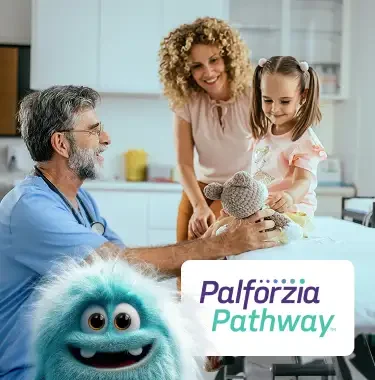Path to PALFORZIA
The patient images are AI generated and are not real patients treated with PALFORZIA.
Individual results will vary with each patient.

Before your first visit with the allergy specialist, consider writing down all the information they may need to get a clear picture of your child’s allergy history. It may also be helpful to make note of questions you might want to ask.
Download our Doctor Discussion Guide to help support meaningful conversations about peanut allergy treatment options.
Questions your child’s allergy specialist might ask
When was the last time your child had a reaction and what caused it?
Is your child allergic to anything else?
Does your child have any other medical conditions?
Does your child ever have trouble swallowing or feel like there’s food stuck in his or her throat?
Can you commit to coming to the office every two weeks for about 6 months?
Can you commit to giving your child a dose of PALFORZIA every day?
Do you understand the dosing process?
Will your child be comfortable carrying epinephrine daily?
Questions to consider asking your child’s allergy specialist
Will my child still need to carry epinephrine?
How soon does PALFORZIA start working?
How will we know it’s working?
Is there an ideal age to start PALFORZIA?
What happens during the appointments?
What are some of the more common side effects?
What are the most severe side effects?
Can my child take other medications while being treated?
What if my child has other allergies?
Are there dietary restrictions my child must follow during treatment?
What follow-up tests are there?
How is PALFORZIA different from other treatments?
Will PALFORZIA allow my child to be treated without injection?

If your child’s allergy specialist has decided that PALFORZIA is right for your child, it will be available only through Walgreens Specialty Pharmacies.
This specialty pharmacy has been certified to dispense medications like PALFORZIA and is different from your usual neighbourhood pharmacy. After receiving the prescription, the specialty pharmacy ships the medication to the location, selected by your healthcare provider.
Because of the risk of anaphylaxis, PALFORZIA is only available through a restricted program called the PALFORZIA Risk Evaluation and Mitigation Strategy (REMS) Program. A REMS program is an FDA-required safety program intended to manage the risks that may be associated with prescription medications such as PALFORZIA. This ensures the potential benefits outweigh the risks, such as the risk of anaphylaxis. The goal of the program is to help mitigate the possibility of anaphylaxis associated with PALFORZIA.
Your child’s allergy specialist can tell you more about this program and help you enroll.
Note: If your child’s allergy specialist is not REMS-certified, they can get certified by also visiting PALFORZIAREMS.com.
The patient images are AI generated and are not real patients treated with PALFORZIA. Individual results will vary with each patient.



If your child’s allergy specialist has prescribed PALFORZIA, they will send your child’s prescription to our support program, PALFORZIA Pathway, or directly to a speciality pharmacy.

Our PALFORZIA Pathway program will check your child’s insurance eligibility and evaluate any other requirements as necessary.

If your child’s insurance has been confirmed, the specialty pharmacy may reach out to you (keep an eye out for a toll-free number) to confirm the PALFORZIA shipment and collect any co-pay (if applicable).

After you have confirmed shipment details, the specialty pharmacy will ship the drug to your confirmed shipment location.
PALFORZIA Pathway Patient Support is available for patients who have been prescribed PALFORZIA to help
you understand your insurance coverage, and answer questions about a prescription status.
For more information on PALFORZIA Pathway Patient Support, call 1-844-PALFORZ (1-844-725-3679).
Eligible commercially insured patients who have been prescribed PALFORZIA may pay as little as $20 per month for PALFORZIA.*
Enroll in the PALFORZIA Pathway™ Co-Pay Savings Program at www.PalforziaCopay.com.
*Co-Pay maximum benefit of $6,200 per calendar year. Terms and conditions apply. See full terms and conditions here.

Models for illustrative purposes only.


Our PALFORZIA Pathway team is available to help you understand your insurance coverage, answer insurance questions, provide support, and explain potential financial assistance options available.
Your child’s doctor’s office can assist in getting you enrolled in PALFORZIA Pathway. Ask your child’s allergy specialist how to get started in our program.
If you do not have insurance or your insurance does not cover PALFORZIA, you may receive PALFORZIA at no cost if you meet specific eligibility and financial criteria.*
*Terms and conditions apply. For more information call 1-844-PALFORZ.
The patient images are AI generated and are not real patients treated with PALFORZIA. Individual results will vary with each patient.


PALFORZIA can cause severe allergic reactions called anaphylaxis that may be life-threatening and can occur at any time during PALFORZIA therapy.
PALFORZIA is a treatment for people who are allergic to peanuts. PALFORZIA can help reduce the severity of allergic reactions, including anaphylaxis, that may occur with accidental exposure to peanut. PALFORZIA may be started in patients aged 1 through 17 years old. If you turn 18 years of age while on PALFORZIA treatment you should continue taking PALFORZIA unless otherwise instructed by your doctor. PALFORZIA does NOT treat allergic reactions and should not be given during an allergic reaction, including anaphylaxis. You must maintain a strict peanut-free diet while taking PALFORZIA.
Stop taking PALFORZIA and get emergency medical treatment right away if you have any of the following symptoms after taking PALFORZIA:
Because of the risk of severe allergic reactions, PALFORZIA is only available through a restricted program called the PALFORZIA Risk Evaluation and Mitigation Strategy (REMS) Program. PALFORZIA is a prescription only medication. Talk to your healthcare provider for more information about the PALFORZIA REMS program and how to enroll.
You should NOT take PALFORZIA if you have uncontrolled asthma, or if you ever had eosinophilic esophagitis (EoE) or other eosinophilic gastrointestinal disease.
Tell your doctor if you are not feeling well prior to starting treatment with PALFORZIA. Your doctor may decide to delay treatment until you are feeling better. Also tell your doctor about any medical conditions you have and if you are taking or have recently taken any other medicines, including medicines obtained without a prescription and herbal supplements.
Your doctor may decide that PALFORZIA is not the best treatment if:
What are the possible side effects of PALFORZIA?
The most commonly reported side effects of PALFORZIA in ages 1 through 3 years were: cough, sneezing, runny nose, nasal congestion, throat irritation, wheezing, stomach pain, vomiting, diarrhea, itchy mouth, pain in the throat, hives, rash, itchy skin, and/or inflammation of the skin around the mouth.
The most commonly reported side effects of PALFORZIA in ages 4 through 17 years were: stomach pain, vomiting, feeling sick, itching or burning in the mouth, throat irritation, cough, runny nose, sneezing, throat tightness, wheezing, shortness of breath, itchy skin, hives, and/or itchy ears.
PALFORZIA can cause severe allergic reactions called anaphylaxis that may be life-threatening.
PALFORZIA can cause stomach or gut symptoms including inflammation of the esophagus (called eosinophilic esophagitis). Symptoms of eosinophilic esophagitis can include:
For additional information on PALFORZIA and/or the possible side effects, talk with your doctor or pharmacist.
Please see full Prescribing Information, including Boxed WARNING and Medication Guide.
You are encouraged to report negative side effects of prescription drugs to the FDA. Visit www.fda.gov/medwatch or call 1-800-FDA-1088.